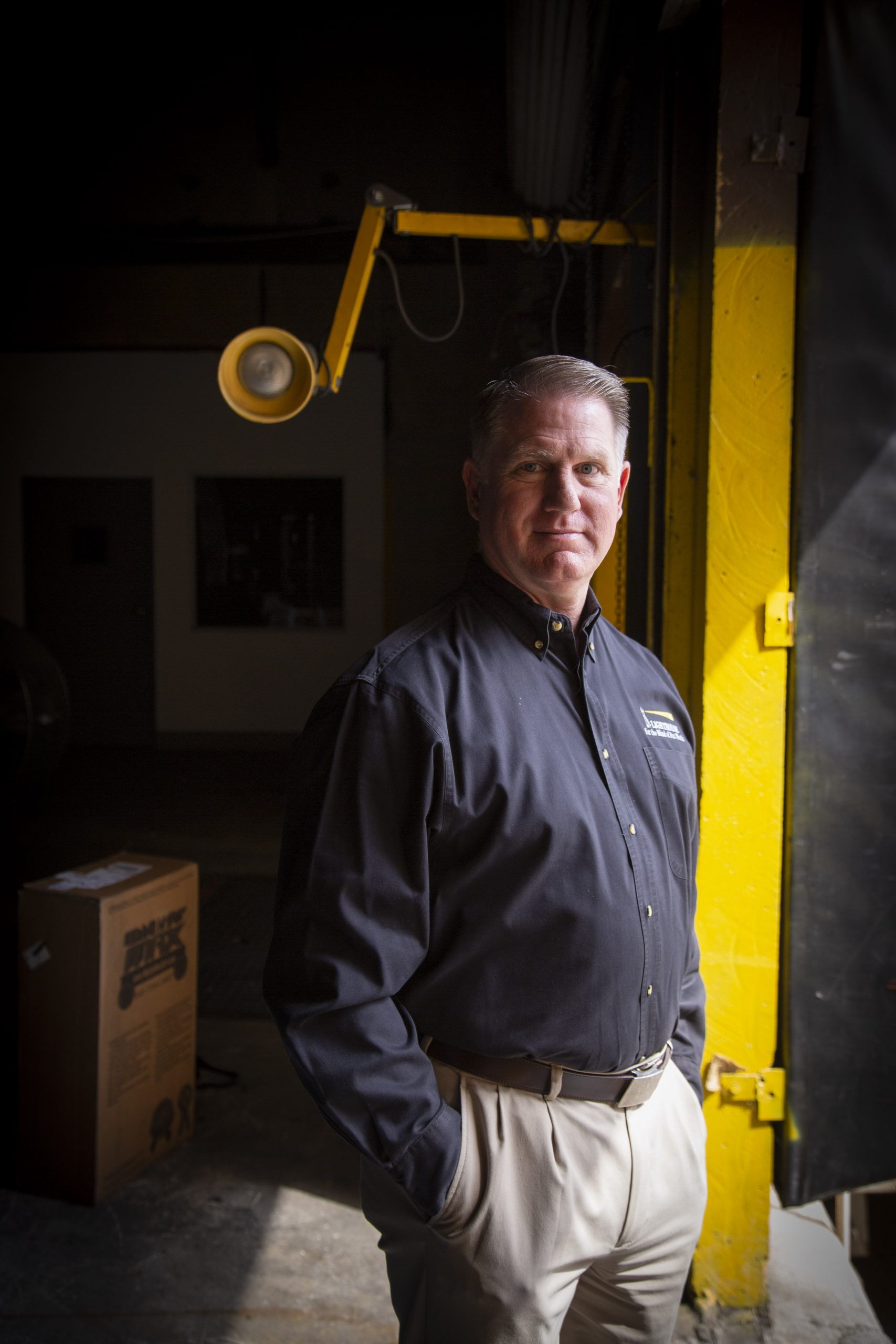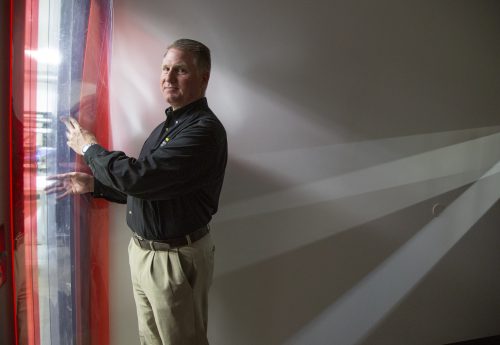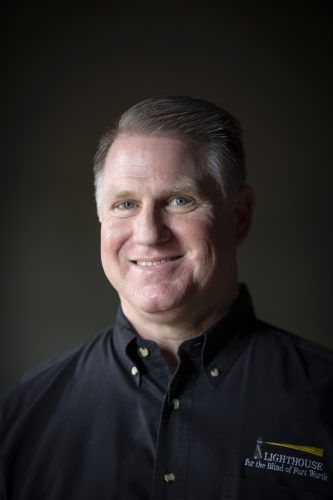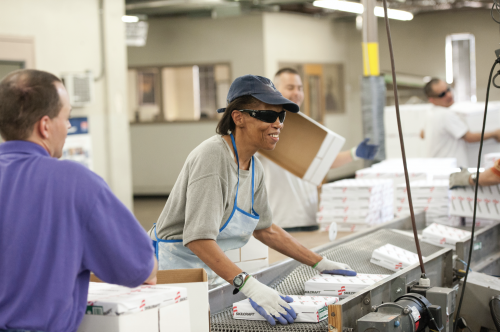Lighthouse for the Blind CEO Saw the Possibilities
A varied career in business took Platt Allen from data systems, to entrepreneurship, to helping the visually impaired reclaim their lives.

Platt Allen is the president and CEO of Lighthouse for the Blind of Fort Worth, a nonprofit organization that provides employment opportunities, specialized training and client services to the blind and visually impaired. Photo by Joyce Marshall
Lighthouse for the Blind CEO Saw the Possibilities
A varied career in business took Platt Allen from data systems, to entrepreneurship, to helping the visually impaired reclaim their lives.
Ask Platt Allen III ’88 (MBA ’97) about the services Lighthouse for the Blind of Fort Worth provides, and its president and CEO talks about Silk Littlefield.
Eight years ago, Littlefield was a runway model and cosmetologist. She enjoyed keeping up with friends and was always ready to give a compliment, in person or online. She wouldn’t scroll past a friend’s new Facebook photo without telling her how great her hair looked.
Until her husband assaulted her — a blow to the head so severe she lost her vision.
Littlefield didn’t leave her house for a year after the doctor told her she was permanently blind. She spent entire days on the sofa.
Her family turned to Lighthouse for the Blind of Fort Worth and Allen’s life skills trainers. The organization matches blind people with resources and trains them how to live independently. It also employs people with life-impeding low vision (20/70 or worse) and blindness.

Platt Allen employs 62 people, 97 percent of whom are blind or vision-impaired. Photo by Joyce Marshall
Littlefield came to Lighthouse holding onto her child’s shoulder and shuffling behind clumsily.
“We asked her what she wanted to do — what are her objectives,” Allen said. “The more she described what she used to do, we helped her to start to envision being able to do all of those things again, just doing them differently than she did before. It became a journey of discovery for her.”
Littlefield’s independent-living training started small: finding the path from the couch to the kitchen, kitchen to the bathroom, bathroom to the bedroom.
After white-cane training, she was able to let go of the shoulders she followed and walk to her mailbox. Next she learned to walk to the neighbor’s house for coffee.
In incremental steps, Littlefield gained more and more independence. She learned Fort Worth’s downtown grid system. She crossed streets and recognized the difference in the textures of grass and concrete with her cane.
Her daughter recorded Littlefield’s ultimate goal — and test of her independence: to get dressed, put on makeup, leave her house, get on a bus bound for downtown and go into one of her favorite dress shops.
Littlefield’s daughter sent the video to Allen.
“The excitement that both of them had was way more rewarding than any money that the state or anybody else could pay us to give her that independence,” Allen said.
Leading Beacon
As a college student, Allen didn’t have a clear vision for his career. He said he just wanted to get into business.
So he chose an undergraduate degree in general business (business majors now select a focused area of study). That generalist mindset carries into his career.
Shortly after graduating, he started working at Electronic Data Systems, the digital innovation company Ross Perot sold to General Motors in the ’80s. Allen moved between departments sometimes twice a year, starting in the electronic funds transfer section and ATM side — Perot’s company owned one of Texas’ first ATM networks. Allen helped develop the first rewards card that allowed holders to earn points for their purchases.

Platt Allen served as the president of the TCU Frog Club and is the board president of Casa Manaña. Photo by Joyce Marshall
Throughout his career, Allen helped companies improve performance by focusing on finances, customers and employees — what he calls a three-legged-stool tactic.
“If you let any one of those legs of the stool get too much attention, obviously the stool is going to topple over,” he said. “You’ve got to keep all three of those in balance.”
Allen, though doing work he enjoyed, was commuting from Fort Worth to Plano, Texas, every workday, an hour and a half each way before new highways were built. So he talked to friend John V. Roach ’61 (MBA ’65), who suggested an MBA as a way to gain business connections in Fort Worth.
That turned out to be good advice, and after graduating Allen started as senior portfolio analyst at AmeriCredit Corp. (later purchased by GM and renamed General Motors Financial Co. Inc.), working his way up to a senior vice president position and managing multimillion-dollar budgets.
Allen said he found the auto financing industry to be too mercurial at the time. “I wanted something that was more stable. … In my ignorance, I thought that owning my own business would be more stable than working for a large corporation serving the financial markets.”
He struck out alone, starting a short-lived manufactured stone company in Fort Worth.
Being a one-man show, Allen said, was a learning experience. “I enjoyed being the one that either made it or broke it. I learned an awful lot about myself. It was a very introspective period of business — trying to critique myself and assess what I could do to make the company better.”
The business crumbled and he sold off his assets. He was asked to lead the operations and finances of St. Vincent’s Episcopal School in Bedford, Texas. He got the school back into the black by outsourcing some services and renegotiating lease contracts. He also solved IT and accounting lags.
“I’ll work myself out of a job,” said Allen, who once served as president of the TCU Frog Club. “I’ll either automate it or get it to where it is so self-sustaining that me being behind the desk is not necessary.”
Spotting Talent
Allen next applied at Lighthouse for the Blind of Fort Worth for a controller job, a position that develops financial business plans and forecasts for the organization’s products. He met with then-President and CEO Bob Mosteller. At the Paris Coffee Shop on Magnolia Avenue, Mosteller told Allen that he was overqualified for the position.
“But a couple days later he called me back and said, ‘Hey, I’m going to retire, and I really think you ought to take my job,’ ” Allen said.
“In my role here, I take that stewardship responsibility very seriously and know that if I don’t succeed, it’s not just me and my employees that suffer from that lack of success, it’s the community that suffers.”
Platt Allen
During the interview, Mosteller had taken note of the numerous business associates who came to the table to greet Allen, who then made introductions.
Allen’s decision to apply for the position came down to one word: stewardship. He recalled his time in Leadership Fort Worth, a development program, and considered the difference he could make in the community through Lighthouse.
“In my role here, I take that stewardship responsibility very seriously and know that if I don’t succeed, it’s not just me and my employees that suffer from that lack of success,” Allen said. “It’s the community that suffers.”
As president and CEO of Lighthouse for the Blind of Fort Worth, also known as Tarrant County Association for the Blind, Allen employs 62 people, 97 percent of whom are blind or vision-impaired.
When he showed up, he kept the existing employees on board.
“The organization has historically been successful, and the folks in those chairs were the ones that had made it successful,” Allen said. “Rather than come in and immediately shake things up, I decided that a better path was to come in and learn and really use the opportunity to leverage the experience that sat behind every one of those desks to make my learning curve shorter.”
He said he sees Lighthouse’s mission in simple terms: Everything it does either has to create jobs or provide a service.
On the jobs side, the organization manufactures a range of products, from foam cushioning that has protected first-aid drops in Haiti to drug-testing kits and flashlights. These products help fund the services side.
Lighthouse runs programs like the orientation, mobility and independent-living training provided to Littlefield. Skills training ranges from teaching white-cane use to differentiating a can of peaches from a can of peas.
“We take it as our job to teach them the skills that they need to reclaim their status — their position in their families or positions in their communities.”
Platt Allen
“Our scope of work is the human experience,” Allen said. “We deal with people who are blind, regardless of where they are in their stage of life.”
People who become blind as adults have great fears, Allen said, including the belief that they are no longer needed. “Our primary mission with each one of those people is to help them recognize the worth that they still have and the value that they can continue to bring to their families. They just have to do it differently than they’ve done it before.
“We take it as our job to teach them the skills that they need to reclaim their status — their position in their families or positions in their communities.”
Lighthouse’s services are for people with blindness and also their caretakers. Both gain independence through skills training. “The whole family unit gets released,” said Allen, who also serves on the board of directors for National Industries for the Blind.
“Platt takes it very personally. He really lives his job and lives what he believes,” said Shannon Shipp, associate professor of marketing at TCU and former Lighthouse board chair. “I admire his determination and how hard he’s worked. … I think the key to his success is that he’s all about the mission, and he’s all about running the business as a successful business.”
Into Focus
To relax after work, Allen switches from contact lenses to one of his company’s products: eyeglasses.
Allen is always looking for new business ventures because selling products creates jobs. He also seeks collaboration opportunities to match people with Lighthouse’s services.
When the Community Eye Clinic, a resource for people with access-to-care issues, opened inside First Christian Church in downtown Fort Worth in 2013, Allen toured the clinic and met optometrist Jennifer Deakins.

Platt Allen said he focuses on creating jobs and providing services to people with vision impairments. Courtesy of Lighthouse for the Blind | Photo by WorkQuest
Allen and Deakins saw an opportunity for collaboration: Deakins, whose patients include the visually impaired and those on a trajectory to lose their eyesight, could refer people to Lighthouse.
In turn, Lighthouse could manufacture eyeglasses that Deakins’ clinic could stock.
An eyeglasses lab tour convinced Allen that the machine shop inside Lighthouse’s 80,000-square-foot facility was suitable for shaping lenses. Lighthouse is now a finishing lab, meaning it cuts prescription lenses to fit eyeglass frames.
The Community Eye Clinic orders all of its glasses from Lighthouse, said Deakins, an assistant clinical professor at the University of Houston College of Optometry and the clinic’s director. “It’s a great relationship: Wonderful, quality customer service has been just outstanding.”
Deakins, who later served as president of the Lighthouse for the Blind of Fort Worth’s board of directors, also wears glasses produced by Lighthouse to correct her nearsightedness. She said she is impressed by Allen’s focus on jobs and services for blind people who might not otherwise be employed.
“He’s a stand-up individual in the community who’s leading a challenging effort,” Deakins said. “He cares truly and deeply about all his employees and the people that he serves.”

Your comments are welcome
1 Comment
Wow, what an article!
Quite hilarious if you actually know anything about the Fort Worth Lighthouse. Kudos to the writing for really creating a “story”. Because that’s what this is. This was obviously not fact checked before hand. Employees of lighthouse should have been interviewed instead of previous board members who aren’t vested in Lighthouse. Last time I checked, having 62 employees with only 35 blind employees doesn’t equal 97%.
Related reading:
Research + Discovery
Reprogramming Cells Could Restore Vision
Sai Chavala’s new research puts hope in sight for people with macular degeneration.
Alumni
Dennis Shingleton Uses Councilman Position to Battle Coronavirus
Decades of health care experience helped the veteran prepare Fort Worth for Covid-19.
Alumni, Features
From ‘Twin Peaks’ to ‘Us,’ She Sets the Scene
Once a TCU soccer player, Ruth De Jong is a top Hollywood production designer.